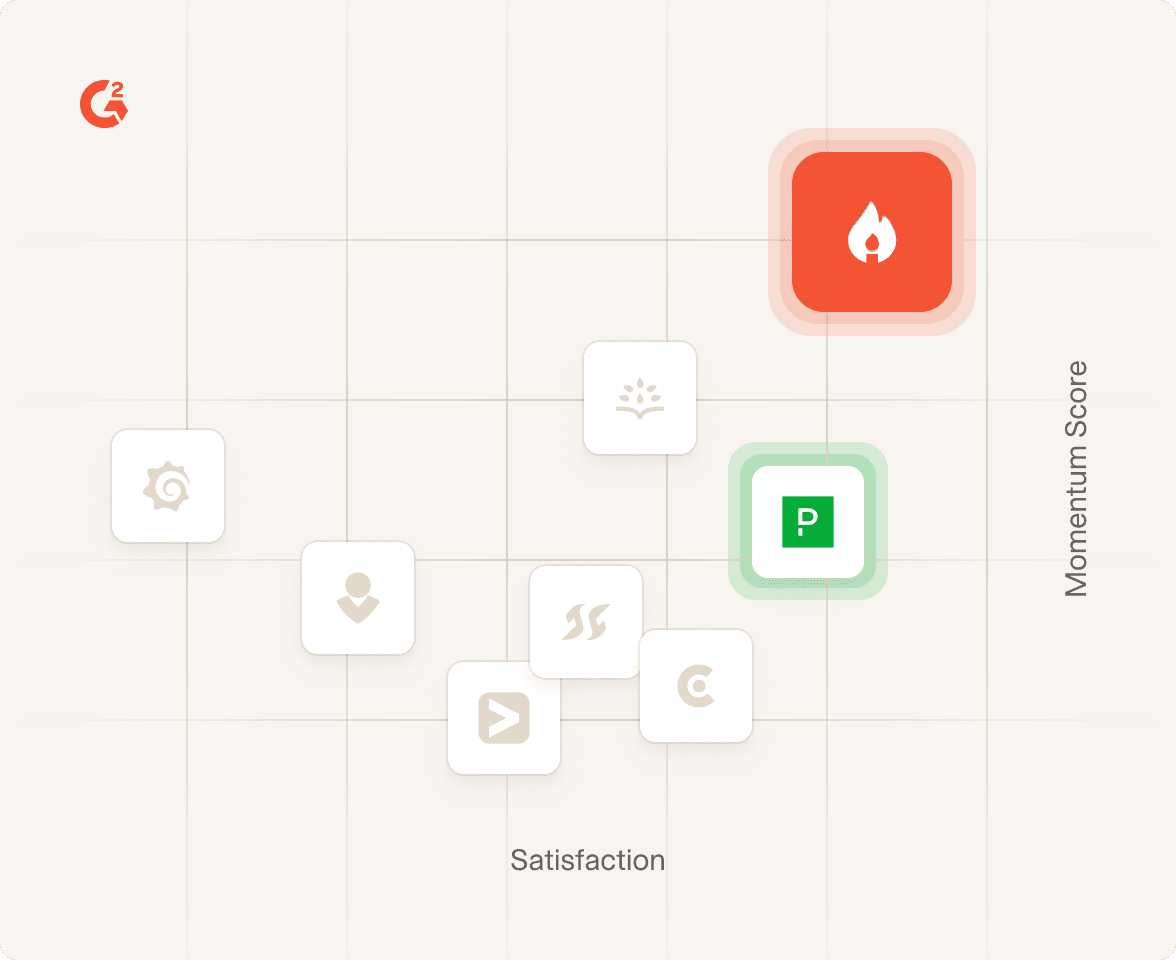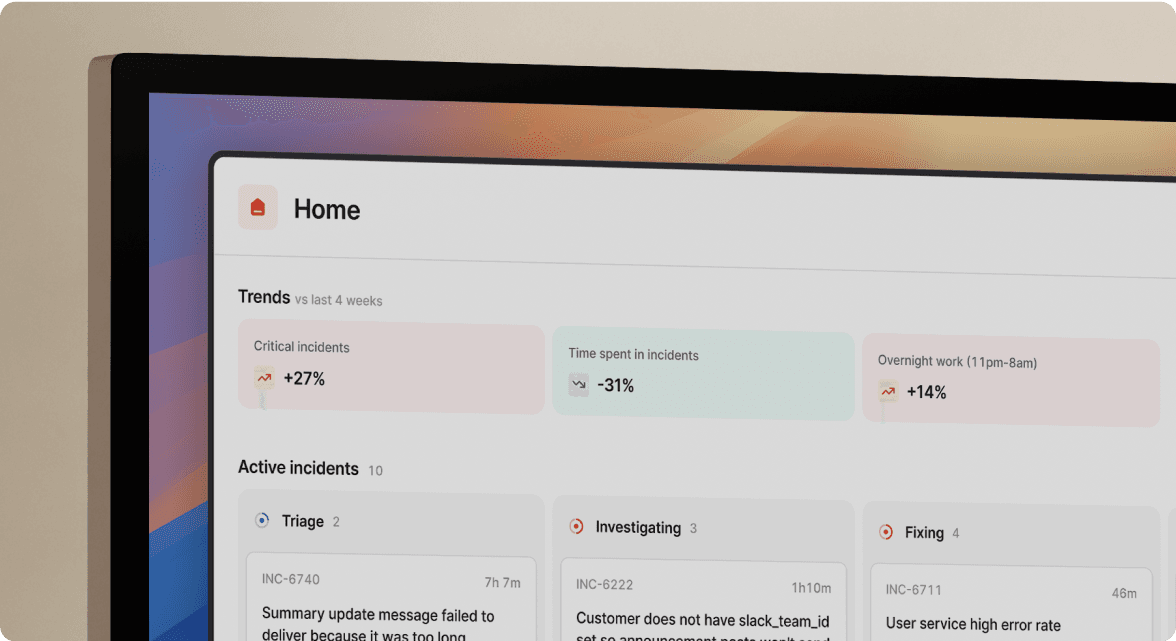The PagerDuty way
Trusted for alerting, but stops short—leaving teams to manage chaos across disconnected tools.
We're built from the ground up for teams who want more than just a wake-up call. We handle everything from alerts to resolution in one sleek, intuitive platform.



From alert to resolution, give your team everything they need to respond quickly, reduce downtime, and keep customers in the loop.
Trusted for alerting, but stops short—leaving teams to manage chaos across disconnected tools.
Run the entire incident in one place, with context, comms, and control from start to finish.
| Details | PagerDuty | incident.io | |
|---|---|---|---|
| Alerting | |||
| Deep ecosystem of integrations | Native support for systems like Datadog, Grafana, Alertmanager, Honeycomb, Cronitor, etc. | ||
| Alert grouping and filtering | Filter inbound alerts, and group based on content and time window. | (requires AIOps add-on) | |
| Generic alert support | For non-natively supported alerting integrations, connect via HTTP, email, etc. | ||
| Unified incident management | Selectively ungroup alerts during an incident, in the event that they've been grouped incorrectly. | ||
| Modern on-call experience | Enrich alerts with context from external systems, like a service catalog, HRIS system, or CRM. | ||
| Scheduling | |||
| Scheduling | Create on-call schedules, including basic/single team, through more complex follow-the-sun | ||
| Advanced Scheduling | Support for advanced, multi-layer schedules to support dual-on-call, shadow rotations, etc. | (requires multiple separate schedules, no guarantees two people paged) | |
| Overrides | Support for individuals to override the configured schedule for a period of time, for example to cover someone on vacation | ||
| Requesting cover | The ability for on-callers to request cover for an on-call shift and have the system find someone to take it and then configure the override | ||
| Escalation paths (policies) | Support for schedules and individuals to be linked together with rules for escalating, i.e. notify the first line, but if they don't acknowledge, escalate to L2 | ||
| Synchronise schedules with calendar | Synchronize an on-call schedule with an external calendar, like Google | ||
| Notifications | |||
| Configure personal notification preferences | Configure the order and timing of all notifications | ||
| Synchronise schedules with Slack user groups | Synchronize active on-callers to a Slack user group | ||
| Support for multiple notification channels | Phone, SMS, Email, Push notifications and Slack | ||
| Other | |||
| Native Android and iOS App | Native mobile applications, approved by Google and Apple, and downloadable through the respective app stores | ||
| On-call compensation calculator | Calculate how much individuals are owed for on-call, subject to custom rules | ||
Native support for systems like Datadog, Grafana, Alertmanager, Honeycomb, Cronitor, etc.
Filter inbound alerts, and group based on content and time window.
(requires AIOps add-on)
For non-natively supported alerting integrations, connect via HTTP, email, etc.
Selectively ungroup alerts during an incident, in the event that they've been grouped incorrectly.
Enrich alerts with context from external systems, like a service catalog, HRIS system, or CRM.
Create on-call schedules, including basic/single team, through more complex follow-the-sun
Support for advanced, multi-layer schedules to support dual-on-call, shadow rotations, etc.
(requires multiple separate schedules, no guarantees two people paged)
Support for individuals to override the configured schedule for a period of time, for example to cover someone on vacation
The ability for on-callers to request cover for an on-call shift and have the system find someone to take it and then configure the override
Support for schedules and individuals to be linked together with rules for escalating, i.e. notify the first line, but if they don't acknowledge, escalate to L2
Synchronize an on-call schedule with an external calendar, like Google
Configure the order and timing of all notifications
Synchronize active on-callers to a Slack user group
Phone, SMS, Email, Push notifications and Slack
Native mobile applications, approved by Google and Apple, and downloadable through the respective app stores
Calculate how much individuals are owed for on-call, subject to custom rules
Configure your alerting tool once, and route alerts with the power of Catalog. Route based on features, teams, systems, or services, making sure engineers only get paged when they need to be.
Our product is built to be flexible. While we believe that our end-to-end incident response is best-in-class, but we understand that not all teams are ready to make the full switch.
Modern on-call and alert management system built for fast moving engineering teams
From alert to resolution, give your team everything they need to respond quickly, reduce downtime, and keep customers in the loop.
PagerDuty pioneered on-call and we have a lot to thank them for… Yet these days a lot of customers are fed up with clunky setups, hidden costs, and the sense that their product just isn't evolving.
Poor experience for non-engineers
Easy for everyone to use, not just engineers.
Complex setup that takes weeks
Fast, intuitive setup that works out of the box.
Rigid alert rules and team structures
Flexible alert rules and team structures.
Hidden costs for basic features
Transparent pricing for all features.
UI that hasn't changed in years
Modern, evolving UI
Poor experience for non-engineers
Easy for everyone to use, not just engineers.
Complex setup that takes weeks
Fast, intuitive setup that works out of the box.
Rigid alert rules and team structures
Flexible alert rules and team structures.
Hidden costs for basic features
Transparent pricing for all features.
UI that hasn't changed in years
Modern, evolving UI

From alert to resolution, give your team everything they need to respond quickly, reduce downtime, and keep customers in the loop.
| Mon | Tue | Wed | Thu | Fri | Sat | Sun |
|---|---|---|---|---|---|---|
| 01 | 02 | 03 | 04 | 05 | 06 | 07 |
| 08 | 09 | 10 | 11 | 12 | 13 | 14 |
| 15 | 16 | 17 | 18 | 19 | 20 | 21 |
| 22 | 23 | 24 | 25 | 26 | 27 | 28 |
| 29 | 30 | 31 |





Ready for modern incident management? Book a call with one of our experts today.
